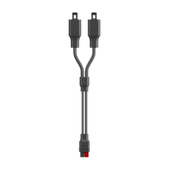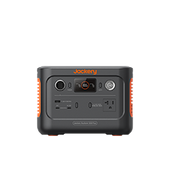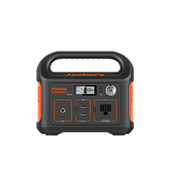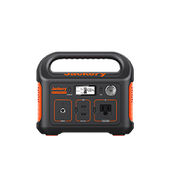Electricity is the heartbeat of modern homes as it powers almost all the devices that play a critical role in our lives. Whenever a power outage strikes, you are not only left behind in the dark, but it also halts our daily routines, compromises security systems, and can easily spoil perishable food items. That is why almost every American is investing in reliable alternate electricity systems that can power their life in case of an electricity outage so that they can continue enjoying all the comforts even when the grid is down.
The two most popular home energy backups are the UPS systems and the household backup generators. While UPS has been traditionally used to battle against power outages, the trend is now changing as more Americans continue to invest in portable power stations and household emergency generators like those manufactured by Jackery, which brings reliable, efficient, and portable power to your disposal. These solar power stations are the perfect way to harness the potential of renewable energy to your advantage and reduce your reliance on traditional and expensive electricity methods.
Let's see what the difference is between the UPS and the household backup generators and which system will best fit your needs.
What Is a UPS System?
An Uninterruptible Power Supply (UPS) is a popular device that serves as a shield against unexpected power disruptions. As a matter of fact, a UPS provides immediate backup power to connected electronics the moment the main electricity supply is interrupted.
Like other electrical systems, UPS also comes in various sizes and capacities. Small UPS systems that are mostly used for personal usage or home energy backup solutions have built-in batteries that store electricity for emergency usage. However, many UPS systems use external batteries to store electricity, which allows you to store a large amount of electricity for more demanding usage or for a long period of time.
Let's have a look at the advantages of a UPS system:
- Instantaneous Power Supply: The most standout benefit of a UPS is its ability to deliver power without any delay. This zero-transfer time ensures that devices like computers, medical equipment, and security systems continue to operate smoothly without any downtime.
- Power Conditioning:Apart from providing backup power, many UPS units offer power conditioning features. They regulate voltage and filter out electrical noise to shield your electronics from harmful surges, spikes, and dips that can occur even when the main power is on. This protection extends the lifespan of your devices and maintains optimal performance. However, this is not the primary function of a UPS device, and many systems even come without this added functionality.
- Safe Shutdown Capability:In the event of a prolonged outage, a UPS provides a critical window of time to save your work and shut down devices properly. This orderly shutdown process helps prevent data corruption and reduces the risk of hardware damage caused by abrupt power loss.
- Enhanced Productivity and Convenience:For those working from home or running a business, a UPS minimizes downtime by keeping essential equipment operational during minor power glitches.
- Versatility and Ease of Use: UPS systems are generally easy to install and require minimal maintenance. They can protect a wide range of devices, including computers, networking equipment, gaming consoles, and even small appliances.
What Is a Household Backup Generator?
A household backup generator is a comprehensive solution designed to supply electricity to your home during extended power outages. Unlike portable generators, which need to be manually set up and started, these systems are permanently installed and connected directly to your home's electrical panel. When the grid power fails, the household backup generators automatically activate to deliver electricity to selected circuits or even the entire house, depending on the system's capacity.
These portable household generators typically run on fuels such as natural gas, propane, or diesel. However, modern-day household backup generators can also integrate with renewable energy sources like solar panels to offer you an eco-friendly alternative that reduces reliance on fossil fuels.
Home backup generators come with many advantages, such as:
- Extended Power Supply: The major advantage of a home electricity backup generator is its ability to cover your electricity needs reliably for prolonged periods. Even if the power outage lasts for days, you can keep on using it without any trouble. Not to mention that good quality household backup generators are scalable so that you can easily expand the system if your power needs grow.
- Automatic Operation:Modern-day home backup generators also integrate UPS functionality, thus giving you an opportunity to continue powering your devices in case of an electricity outage.
- Whole-Home Coverage:Household standby generators can power multiple high-demand appliances simultaneously, including HVAC systems, water heaters, refrigerators, and water pumps. This capability maintains your home's comfort and safety during an outage.
- Increased Property Value: Installing a household backup generator can enhance your property's appeal. Prospective buyers often view it as a significant asset, especially in regions where power outages are common due to weather conditions or infrastructure issues.
- Energy Independence: If you are interested in off-grid living or reducing dependency on the electrical grid, a backup generator is a great choice since you can also use it by voluntarily turning off the grid and continuing to use free electricity manufactured by solar panels.
- No Emissions: Traditionally, household backup generators have used some kind of fuel for their operation, but the solar-powered capability of modern-day generators allows you to generate clean electricity that does not produce even a tiny bit of emission.

Key Differences Between UPS Systems and Backup Generators
Let's see what the key features between UPS systems and household backup generators (like the Jackery Solar Generator 5000 Plus) are, which will allow you to make the best choice according to your personalized power requirements.
|
Feature |
UPS System |
Backup Generators |
|
Power Output and Capacity |
Typically 600VA to 3kVA, with smaller batteries providing under 1kWh of storage. Suitable for small electronics. |
Ranges from 5kWh to 60kWh or more, with outputs up to 14.4kW. It can power large appliances and entire home systems. |
|
Duration of Power Support |
Short-term support: 15–30 minutes at full load; up to 1–2 hours with reduced load. |
Long-term support: This can run for days or weeks, depending on capacity and fuel/solar input. |
|
Setup and Installation |
Simple installation; connects to home sockets but requires basic wiring. |
Requires professional installation, integration with home systems, and potentially solar panels for renewable input. |
|
Cost |
Lower upfront cost. Maintenance primarily involves battery replacements. |
Higher initial investment but long-term savings with solar compatibility and expanded functionality. |
|
Primary Use |
Protects sensitive electronics like computers, modems, and medical devices during short outages. |
Provides full home backup, powering HVAC, refrigerators, water heaters, and more. |
|
Eco-Friendliness |
Relies on grid electricity. |
Solar-powered options are available for emissions-free operation and reduced carbon footprint. |
|
Automatic Switchover |
Instantaneous power delivery with no delay for connected devices. |
Modern generators also offer UPS functionality for seamless power switchover. |

Introducing the Jackery Solar Generator 5000 Plus
The Jackery Solar Generator 5000 Plus represents the pinnacle of modern household backup generators, designed to offer unparalleled reliability, scalability, and eco-friendly performance. With advanced LFP technology, versatile charging options, and seamless integration capabilities, this system is the ultimate choice for ensuring your household remains powered during outages or off-grid living.
Key Features
-
Massive Capacity and Scalability
- Base capacity of 5kWh, expandable up to 60kWh.
- Output ranges from 7.2kW to 14.4kW, providing robust support for high-demand appliances and whole-home power needs.
- Capable of running your home for up to two weeks during extended outages.
-
Flexible and Rapid Charging Options
- AC Charging:Recharge in just 3.5 hours via a standard 1800W outlet or as fast as 1.7 hours using a Smart Transfer Switch for 4000W input.
- Solar Charging:Harness solar energy with two 500W solar panels to fully charge in approximately 6.5 hours under optimal conditions.
- Hybrid Charging:Combine solar, AC, and transfer switch inputs for maximum efficiency.
-
Seamless UPS Functionality
- Provides instantaneous power switchover during outages, ensuring critical devices remain operational without interruption.
-
Advanced LiFePO4 Battery Technology
- Built with durable lithium iron phosphate (LiFePO4) batteries, offering over ten years of lifespan and enhanced safety.
-
Eco-Friendly Operation
- Supports solar power for clean, emissions-free electricity.
- Ideal for reducing reliance on the grid and lowering your carbon footprint.
-
Versatile Output and Device Compatibility
- Dual voltage support (120V and 240V) for powering a wide array of household devices.
- Features multiple ports, including USB-A, USB-C, standard AC, DC, and expansion ports for direct device charging.
-
Quiet, Portable Design
- Operates at just 30 decibels, ensuring minimal disruption.
- Equipped with wheels and a handle for easy mobility despite its robust capacity.
-
Smart Monitoring and Control
- Manage power usage and monitor system performance via the intuitive Jackery app on your smartphone.
Why Choose the Jackery Solar Generator 5000 Plus as a UPS
If you’re seeking a future-proof energy solution, the Jackery Solar Generator 5000 Plus combines the best of advanced technology and eco-friendly design. It’s a reliable, quiet, and scalable household backup generator that caters to modern power demands, ensuring your household is always prepared for outages or off-grid adventures.
Wrapping-Up
All of us need reliable power to keep our daily lives going comfortably. However, when a power outage strikes, we are not able to do it as our ability to run appliances of our choice reduces drastically. While both UPS systems and household backup generators offer valuable solutions to keep your home running during outages, they offer different sets of advantages.
UPS systems provide immediate and short-term power to protect sensitive electronics and allow for safe shutdowns, while household backup generators like the Jackery Solar Generator 5000 Plus offer comprehensive, long-term support capable of powering your entire home for days. Choosing between the two depends on your specific needs, budget, and the importance of uninterrupted power in your life. Having said that, a household electricity backup is the most effective and reliable way to achieve energy independence and stop worrying about electricity availability once and for all.





















































































































Leave a comment